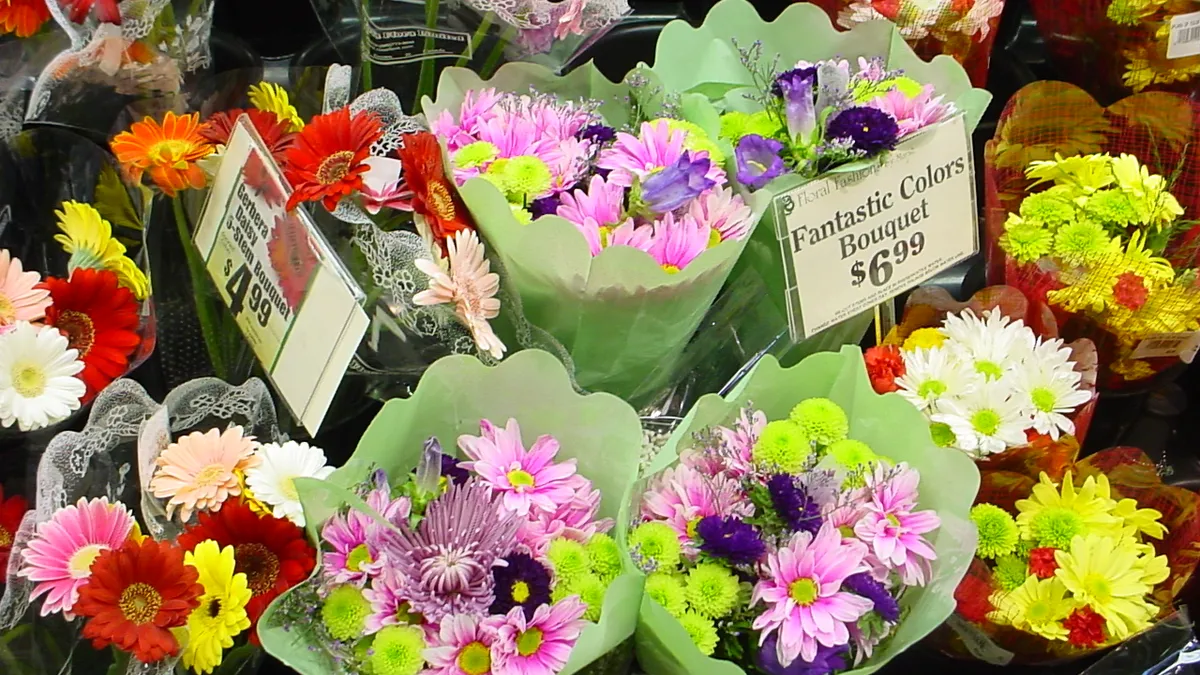Dive Brief:
- Kroger is introducing a premium and sustainable store brand floral line called BLOOM HAUS, which will debut in time for the holidays, according to a company statement. The new line carries the Rainforest Alliance Certified seal, which means plants have been grown and harvested using sustainable and socially responsible practices.
- The new floral line is part of the grocer’s strategy of “enhancing and building [store brands] as a vibrant growth vehicle,” according to the release. Private brands are a key driver of the company's Restock Kroger initiative, which is largely about generating more value from existing grocery stores.
- The new floral line will be sold in stores and available for online ordering using Kroger's ClickList curbside pickup service. According to the release, the line also could become available for home delivery as the retailer expands its delivery services.
Dive Insight:
The floral department plays a unique role in the grocery shopping experience, at times serving as a destination for holiday flower-buying and other special occasions — among them, birthdays, anniversaries and proms. At other times, the department becomes part of the “everyday” shopping experience overall — a pretty place where consumers can browse and perhaps self-gift, while retailers hope to capture impulse purchases.
Research from the Produce Marketing Association and the Food Marketing Institute shows that everyday sales account for 42% of the mass-market floral retail business, while holiday sales represent 31%. While not staggering, the floral department contributes nicely to store economics too. According to PMA and FMI’s research, the average supermarket generated $225,000 in floral sales in 2015. Year-over-year sales growth was 5.6%, a healthy rate compared with some other grocery categories. The department’s average gross margin is 44%, a welcome boost for an industry notorious for operating on razor-thin margins.
Interestingly, Nielsen research finds a strong correlation between floral performance and fresh sales overall. So winning in floral often means winning in fresh, too. As grocers increasingly focus on perimeter departments, floral certainly should be considered an area that can differentiate the in-store shopping experience and help retailers connect emotionally with customers.
Since Nielsen also finds that two-thirds of shoppers prefer to shop for floral in stores, retailers should give floral strong consideration as a brick-and-mortar traffic driver. Still, as a good portion of grocery shopping moves online in the coming years, making floral available for home delivery or through click-and-collect programs is important too, which is part of Kroger’s plan for its new line.
The recent move by the nation’s top supermarket to elevate its floral line not only aligns well with industry trends — fresh and premium focus, sustainability efforts and grocery e-commerce — it’s also in keeping with Kroger’s strategy to enhance and increase its store brands. The retailer currently generates more than $20 billion a year from private labels. Store brands comprise 25.6% of Kroger sales and 28% of units sold.
The retailer has a successful track record of launching on-trend store brands. The supermarket chain has grown its Simple Truth natural and organic label into a $1.6 billion brand in just three years. It also recently launched a meal kit line under the name Prep+Pared. With the private brand grocery market poised for growth, the retailer not only is looking to capture more share, but also driving increased shopper traffic and loyalty along the way.








